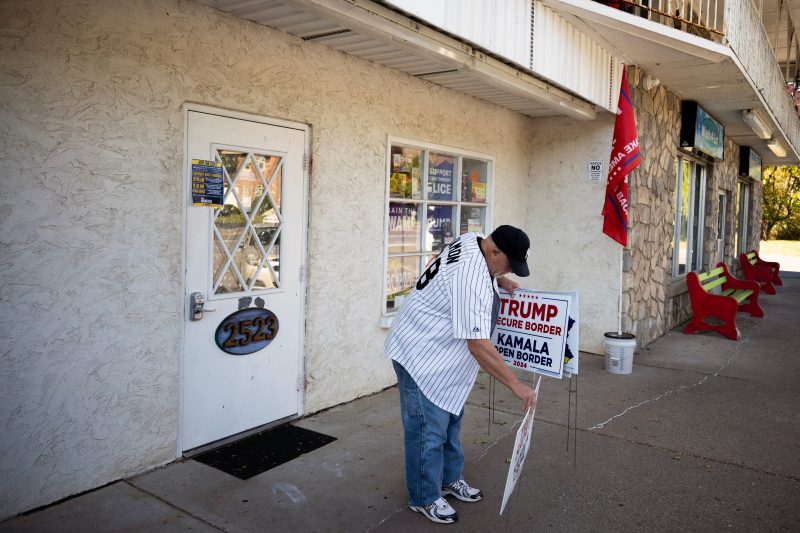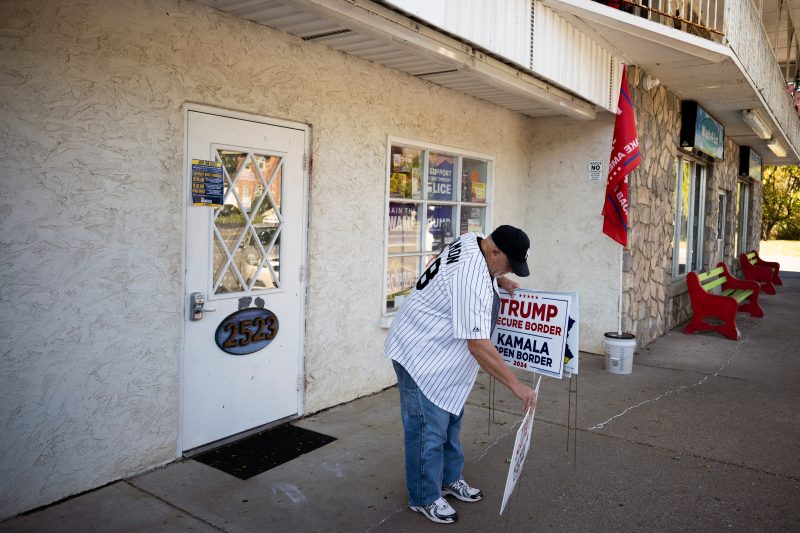
BETHLEHEM, Pa. — The challenges both Democrats and Republicans are confronting in the presidential race were on vivid display here at a strip mall in Northampton County — which has voted for the winner of almost every election in the past 100 years.
Liberal canvasser Sierra Marquardt, 18, wandered the parking lot with some worry while registering people to vote, usually opening with: “Do you believe in a woman’s right to choose?” Marquardt voiced concern about Democrats’ support among non-White voters, which several polls show has softened.
“A lot of Black men, a lot of Hispanic men that I’ve talked to, they’re all Trump,” Marquardt said. “I’ve registered a lot of Black Republicans.”
Whether Republicans can capitalize on any shifts in the electorate is another question, as they work with a less expansive, nontraditional strategy to turn out disengaged voters, people who have not voted before, men under 50 and others less likely to cast ballots. At the Walmart nearby, 41-year-old Mervyn Trotman was far from confident he would make it to the polls — even though he likes Donald Trump, laments the prices at the grocery store and supports Trump’s calls to crack down on undocumented immigrants. The Black resident of Bethlehem said he has never voted and still needed to register.
“I’ve been looking at it,” he said. But he was noncommittal.
The battle over voters in Northampton County reflects some of the biggest themes and tensions running through the presidential contest all across the America less than three weeks from Election Day. Strategists view Pennsylvania as perhaps the most important swing state on the map this year and believe its 19 electoral college votes could be the tipping point. Northampton is an unusual cross-section of the country — one of 26 “pivot” counties nationwide that backed Barack Obama in 2008 and 2012, Trump in 2016 and Joe Biden in 2020.
Democrats have a huge nationwide operation working to turn out their base and draw in moderate voters uncomfortable with Trump. The candidacy of Vice President Kamala Harris has energized women, young people and Black voters, and tapped further into outrage over abortion restrictions. But Trump has chipped away at Democrats’ longtime dominance with voters of color, public opinion surveys show, and Harris is pitching her agenda as “a new way forward” while also having to answer for voters’ frustrations with the status quo.
Republicans are tapping into anger over inflation and immigration. Polls give Trump the advantage on those top issues. But Trump’s character, efforts to overturn the 2020 election and role in ending Roe v. Wade have alienated many Americans. Trump’s smaller campaign operation is trying to turn out lower propensity groups, such as younger men, who are while Democrats hold the edge with especially engaged voter groups including people with college degrees.
The GOP is also working against Trump’s years-long disparagement of mail voting and the electoral process, urging their voters to get ballots in early and turn out for a victory “too big to rig.”
Gisell Casanova said she doesn’t plan to vote this year because she believes Trump’s false claims that the 2020 election was stolen from him. “I believe that they’re selected and not elected,” said Casanova, 48. “I don’t believe anymore. I lost my hope in the government.”
Trump’s bedrock base of loyal supporters, including many older, White voters, is evident across Northampton, a reminder of an imposing force Democrats are facing on a wide scale. But so is the fierce opposition to the former president, which Democrats have successfully harnessed in every national election since his 2016 win.
“I think Donald Trump is the Antichrist,” said Susan Finnigan, 72, who calls herself an independent. “This man is so despicable, the way he puts down people, degrades people, lies constantly, calls everybody names.”
She said she plans to vote for the first time in her life this fall, finally pushed into action. “I thought, if he gets in office, this is really, really dangerous,” Finnigan said.
On the other side was Richard Yuhas, 82, who used a curse word for Harris when conservative door-knockers showed up at his porch. For most of his life he didn’t vote because he “was happy with what was going on,” he said. No longer. He cast his first ballot for Trump in 2020 and plans to vote for Republicans up and down the ticket this year.
“We got issues with the economy,” Yuhas said. “We got issues with the border. … We are worried because there are people walking down the street that I don’t know.”
Northampton is hotly contested up and down the ballot, home to one of the country’s most vulnerable U.S. House members and one of Pennsylvania’s tightest state legislative races, in addition to tough battles for Senate and president. The county of about 320,000, north of Philadelphia, has manufacturing roots and an increasingly diverse population where both parties see opportunities.
Trump held a rally in nearby Lehigh County this spring, and allies such as Sen Marco Rubio (R-Fla.) have come through the area more recently. Democratic vice-presidential nominee Tim Walz was in Northampton County last month for a rally with special guests such as “Hamilton” actor Anthony Ramos, aimed in part at the roughly 15 percent of county residents who identify as Hispanic or Latino.
Democrats say they are not taking any votes for granted, and campaign officials voiced confidence about their ability to win voters of color, particularly as they remind them about Trump’s policies and rhetoric. The campaign has a slew of outreach initiatives, including targeted, multilingual advertising.
“We’re talking about turning the page on the Trump era and presenting people a new way forward that focuses on making their day-to-day lives better,” said Brendan McPhillips, a senior adviser for the Harris campaign in Pennsylvania.
The outcome here and beyond will depend on swing voters but also the candidates’ ability to motivate their supporters and turn out new ones. A particular jump in Democratic turnout helped swing Northampton County to Biden in 2020.
Voters in Northampton often answered questions about the candidates with grimaces and harsh language, illustrating the intense dislike motivating voters on both sides. Expletives were not uncommon.
Door-knockers who have fanned out across the area include representatives of the national conservative group Americans for Prosperity Action, who were recently out promoting Republican candidates for the Senate and House, not the presidency. But the top of the ticket loomed large. One woman appeared confused when an AFP Action canvasser asked whether she would vote for GOP Senate nominee Dave McCormick and House candidate Ryan Mackenzie.
“… And Donald Trump?” the woman asked. She laughed. “Do you know where I can get a Trump sign?”
Democratic door-knockers are trained to use the “new way forward” language. “She’s running to bring down costs from groceries to housing and prescription drugs, and to protect Americans’ fundamental freedoms such as the freedom to choose,” they say.
The Harris campaign has a big office in Easton and said last week that it had knocked on more than 24,000 doors countywide. Some of the volunteers have come in from New Jersey.
“I can tell you it’s not 2016,” said Will Von Klemperer, a volunteer door-knocker from Summit, N.J. He remembered growing suspicious of all the people telling them, days before the 2016 election, that they were undecided between Trump and Hillary Clinton.
“People did not want to say they were voting for Trump,” he said.
Now, he said, the stigma of a Trump vote has eased. Democrats say the energy on their side is also formidable.
“This is a joyful campaign,” retiree Russell Sutton, 74, said while volunteering in the Easton office, plastered with signs like “STOP TRUMP” and “UNION LABOR.”
A Trump official said they have an office in Northampton and are door-knocking and phone-banking but declined to share details. The campaign will increasingly be arguing to voters that the election is more about everyday issues rather than “personalities or who has the nicer tweets,” said the official, who spoke on the condition of anonymity to talk more freely.
Glenn Geissinger, chairman of the Northampton County Republican Committee, said he’s been encouraged by data on mail-in ballot requests from less-likely voters and believes the Trump enthusiasm of 2016 remains.
Eight years ago, he said, “I watched people come to the polls who had not voted in 20, 30 years to vote for Donald Trump,” he said.
“That same energy persists today.”

